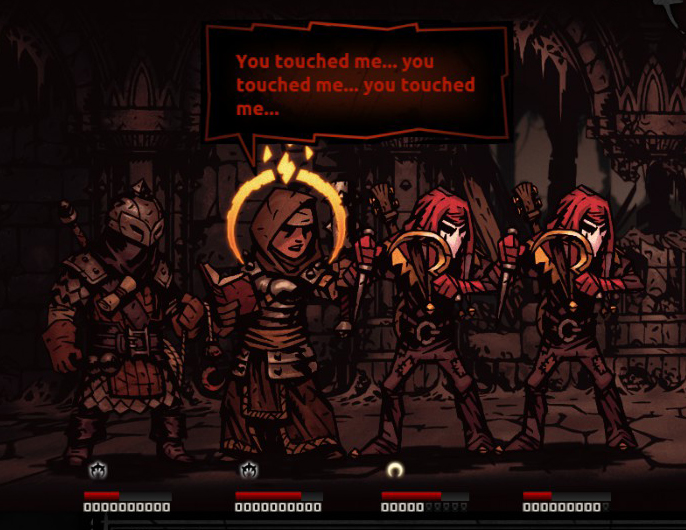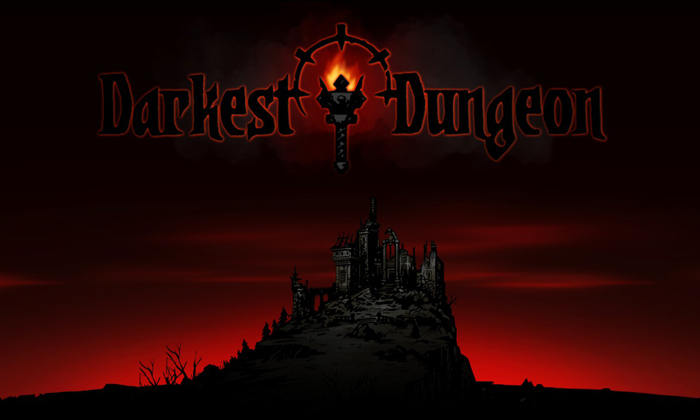
Darkest Dungeon Review: Laughing While I’m Dying
Last year, I helped fund the indie game Darkest Dungeon through Kickstarter. I got my early access copy last week, and spent about 5 hours with this game over the weekend (which looking at my Steam records, you know that’s pretty good). I know I’m not anywhere done with it yet!
As far as early access games go, and I’ve played a lot of them, Darkest Dungeon feels very close to a polished release. I don’t know if the team has a lot more features in mind on down the line, but what is there is extremely challenging and very fun.
Note: Non-Kickstarter folks can pick up a copy on Steam starting tomorrow, February 3rd.
What is Darkest Dungeon?
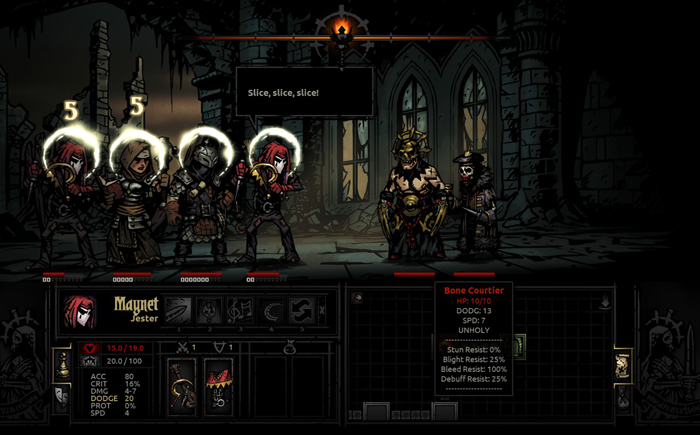
Darkest Dungeon is a conglomeration of a lot of gaming elements, which is one of its strong points. It’s a roguelike dungeon-delver that has a strategic turn-based battle system that hearkens back to oldskool tactics and RPGs. It’s not difficult to learn the system, but seeing that you tend to have adventurers coming and going all the time, it’s very complex and doesn’t get dull.
The reason for this, you see, is that your adventurers aren’t just stats and skills on the screen. They’re people with flaws and quirks – good and bad – that become affected by what they see in the depths of the dungeon. This makes up the most original part of the gameplay… because when you’re dealing with people, personality and group dynamics, literally anything can happen. And it does.
The Breaking Point
Each hero joins your roster with their own personality, and sometimes negative traits. As they adventure into the dungeon, everything weighs in on their stress levels: how dim the torchlight is, a muttered insult by a companion, taking damage in battle, or seeing a companion on death’s door.
Their personality can randomly change through the process, sometimes for the worse. When their stress meter hits max, they get a resolve check, which can lead to them falling apart emotionally and earning a negative trait…
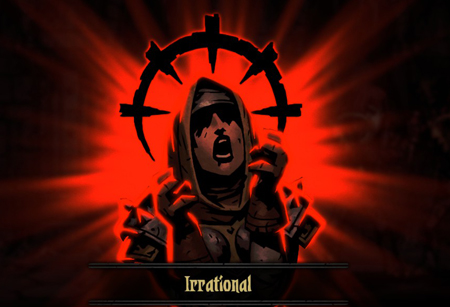
…or rising to the challenge and becoming stronger!
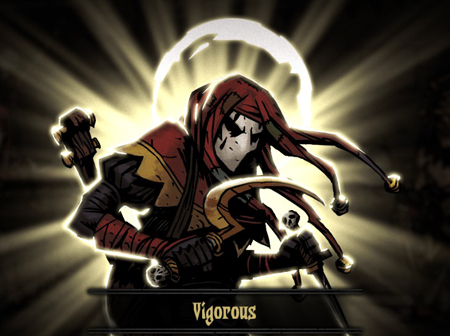
These traits have different effects on group dynamics, with really random outcomes. I had a healer who became abusive who wouldn’t stop spouting insults at the rest of the team (which increased their stress). I had a fighter who became so selfish that when someone else struck a good blow during battle, she’d belittle them. One tank turned masochistic and refused to let the healer heal him. I had a jester who got so cracked that all he could do during battle was laugh maniacally. I had a rogue who got inspired so much that he’d shout things out during battle that gave a party-wide buff!
Yeah, these guys get pretty messed up.
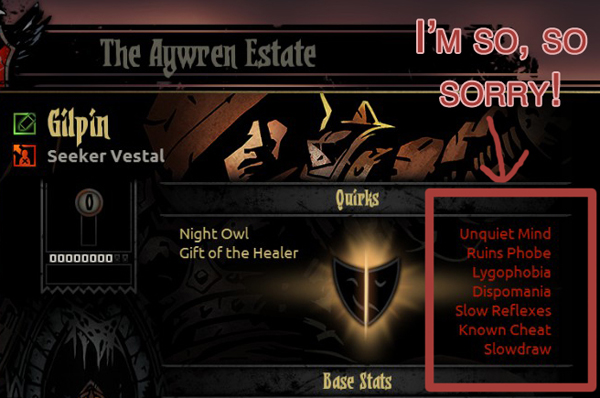
Crazy things can happen in battle due to this system. Characters swap places in the party formation on their own (and formation determines which skills they can use, so it’s super important). Characters refuse to heal or be healed. Characters auto attack or choose to skip their turn.
And when someone dies, it’s for good. There’s no turning back the clock in this roguelike. So don’t get too attached to anyone. (Like I do… oh so sad. So sad.)
It may sound frustrating, but I have a hard time being angry with this game. Not when your heroes are so darn charming and funny, even as they’re slowly bleeding out their last drops of life on the dark dungeon floor. It’s agony. But it’s good, FUN agony!
Building a Legacy
Like good roguelike games, death may be permanent, but there’s other parts of the game that you can build up. As you complete dungeons, you unlock new dungeon scenarios (some of higher levels) and bosses. So, there’s progression in the challenges you face… if your characters survive enough to level up.
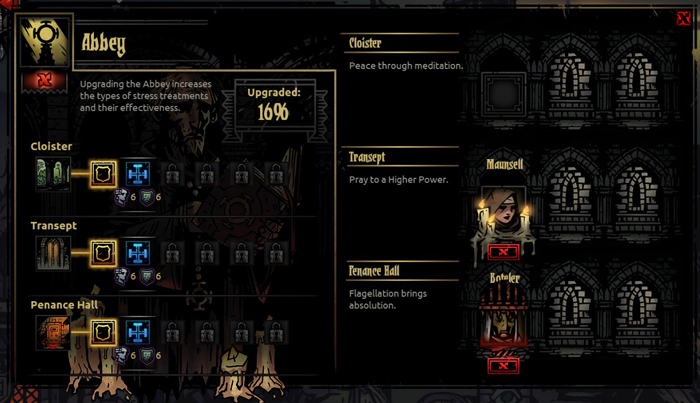
You unlock buildings within the town, such as an abbey and tavern, where your stress-afflicted heroes go to unwind. This is random as well, but can sometimes remove some of the negative traits they earned due to stress, and reduces their overall stress over time.
You also can bring back treasures that help build up the town around the family estate. As you level up the tavern, for example, you can improve how much stress is reduced, lower the cost of sending a hero to the tavern, and open up more slots for more heroes to use the tavern at once.
You can also recruit sparkly-eyed new heroes and release heroes that are too far beyond repair. I see that you can train heroes in skills and upgrade armor and weapons, but none of my heroes have lasted long enough for me to put those kind of resources into them. Maybe one day.
Reaching Goals
The game has overarching goals for you to achieve, such as “Defeat the Necromancer Apprentice,” which leads to unlocking something else eventually – not quite sure what, yet. I’ve tried not to spoil myself by doing too much research on this game. 🙂
I did find and challenge the Necromancer Apprentice last night… and it was pure tragedy. I went into the fight with the upper hand, but ended up losing two of my heroes to the battle (one which I’d had since the very beginning). Not only that, but I beat him down to 2 HP left before I was forced to retreat or face a full party wipe. Seeing the only effective healer I have was in that group, I chose to fail the dungeon rather than lose even more.
But really… 2 HP!!! Augh!
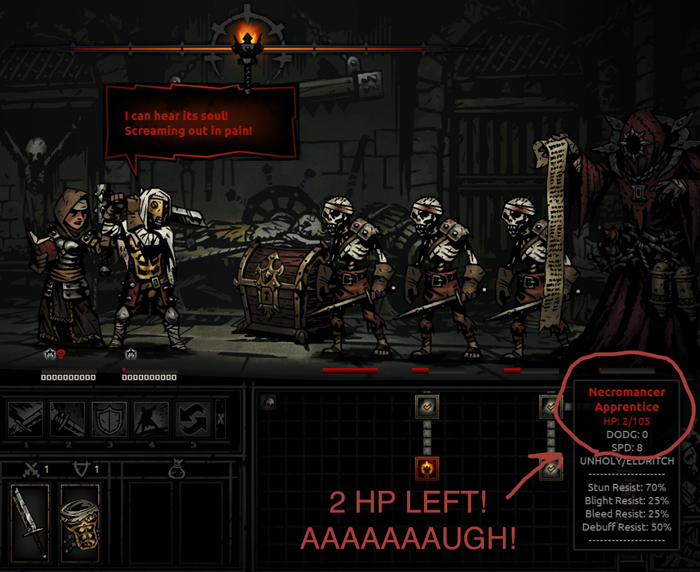
Anyhow. If any of this interests you in any way, and you don’t mind a challenging game, definitely get Darkest Dungeon! It’s an awesome early access, and I can only seeing it getting better!
